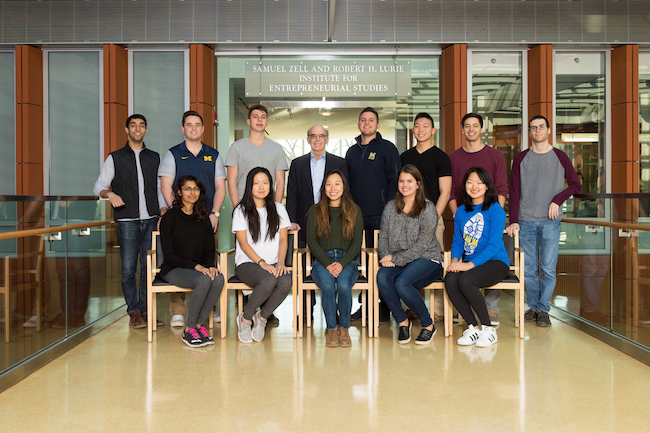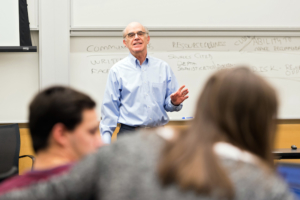For 20 years, MBA students at the University of Michigan Ross School of Business have been practicing venture capital and investing real funds through the Zell Lurie Institute. But until recently, there was no opportunity for Ross undergraduates to do the same.
In fall 2015, the institute launched the Zell Early Stage Fund to give undergraduates at the Ross School a shot at learning the ins and outs of venture capital, with fund members chosen through a selective application process and the program serving as a capstone course that lasts through their junior and senior years.
Now, after 18 months of instruction and research, the first fund participants have made their inaugural investment. Given $250,000 to play with, they are putting $150,000 into Admetsys, a company that has developed an artificial pancreas to monitor blood glucose levels and administer insulin to patients with diabetes.
“The students find the companies. They prowl around incubators and accelerators, and they follow particular industries,” says Erik Gordon, clinical assistant professor at Ross and faculty instructor for the fund. “The MBA students actually found this one, and it was a little too early-stage for them, so they passed it on to the undergraduates.”
Gordon thinks the fund could see a big financial return, because Admetsys has the potential to save hospitals lots of money. “If someone goes into a diabetic coma, there is no hotel in the world that costs as much as a day in the ICU,” he says. “So this is a really valuable device.”
TAKING A RISK WITH UNDERGRADUATES
The institute has seen financial success with student-run venture funds before. There are four others at the Zell Lurie Institute: the Wolverine Venture Fund, the Zell Lurie Commercialization Fund, the Social Venture Fund, and the Zell Founders Fund. After 20 years, the oldest student-run venture fund in the nation, has $7 million in assets under management and has invested in 27 companies.
Gordon, who championed the creation of an undergraduate fund, says the Zell Early Stage Fund was modeled off the Wolverine Fund. “We’ve sent a lot of MBA students out pretty well trained,” he says. “Some become venture capitalists, some become private equity people, and some become entrepreneurs. We wanted to recreate that with undergraduates.”
But Gordon says launching the fund was a bit of a risk — not because Ross undergrads weren’t up to it, but because he wasn’t sure company CEOs and other VCs would take them seriously. “It was a challenge. The students can do the math, and they will do the work,” he says. “But could they talk to CEOs and VCs, and not come across as students? Can 19- and 20-year-olds do that?”
Gordon decided the risk was worth it — and he has no regrets. Working with undergraduates, he says, has taught him two things: they can do it, and he’s glad he’s not an undergraduate student these days, because they’re fierce.
CURRENT STUDENTS ADMIT INCOMING STUDENTS
For the first year of the Zell Early Stage Fund, interested students applied at the end of their sophomore year. Gordon admitted the inaugural junior-year group himself. It was a competitive process, he says, and students were chosen based on their prior experience and interests.
Benjamin Rathi, now a graduating senior, was one of the students Gordon admitted to the first class. Before joining, he had already run several startups. The one he’s most passionate about, he says, is Blueprints for Pangaea, a 501(c)(3) nonprofit that reallocates unused medical supplies from the U.S. to hospitals in need around the world. “Working on Blueprints taught me a number of important lessons about running and scaling a startup company,” Rathi says, “and improved my ability to evaluate entrepreneurs doing the same.”
At the end of the first year, the inaugural class picked the new junior class, Gordon says, and that’s how things will go from here on out. “It’s student-run, so I’ll weigh in with some advice when they ask for it, or if I think they need it. But the older students pick the new students,” he says.
The whole group — juniors and seniors — meets for two hours every week in a lecture-like setting, where Gordon teaches them about evaluating ventures at the earliest stage of development. “Those two-hour sessions are the easy part. When we’re looking at a business, or we’re doing our due diligence on an investment, that’s more like being a banker trying to close a deal.”
Often, he says, the students work late and night and early into the morning, trying to do as much research and work as they can before making a decision about whether to invest in a company. Juniors act like associates at the fund, and seniors fill partner and mentor roles.













Questions about this article? Email us or leave a comment below.